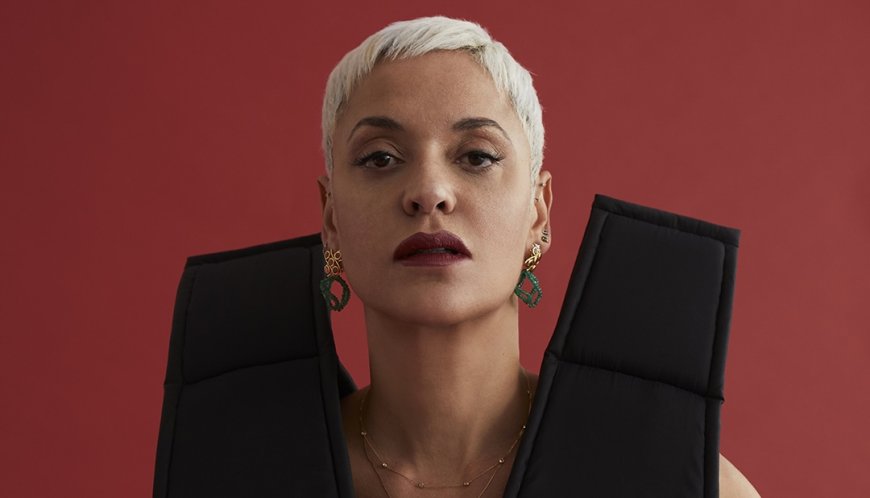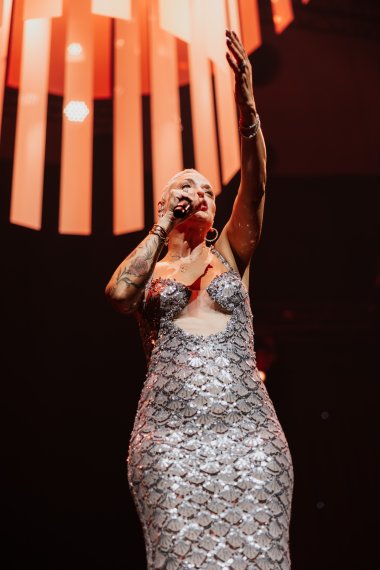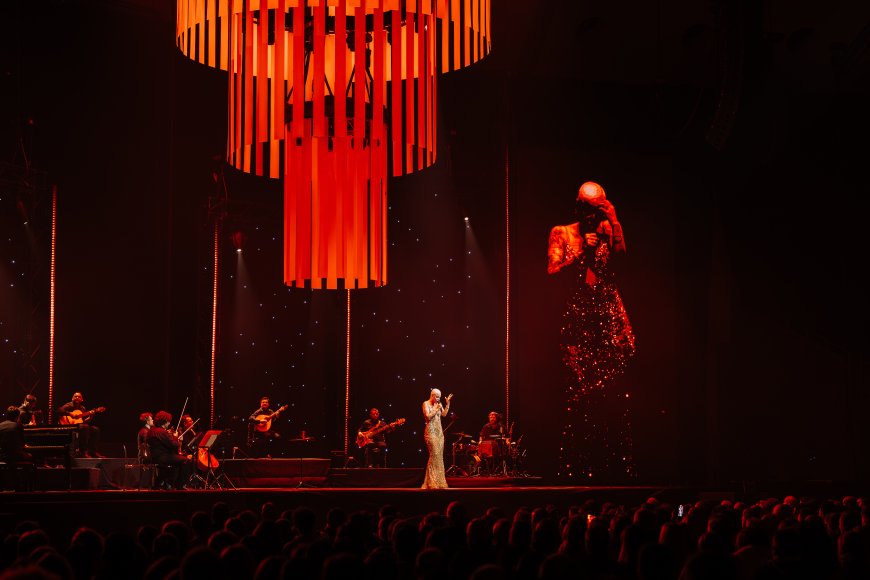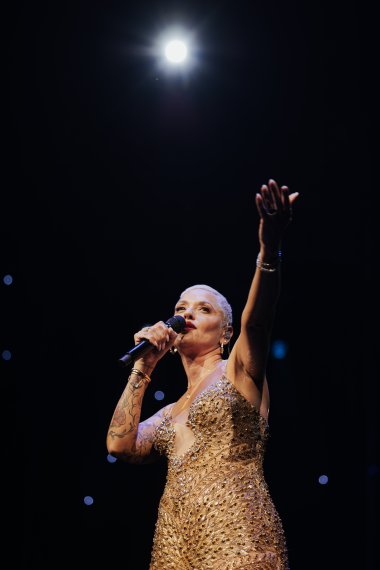
Mixing cultures comes naturally to the vocalist Mariza. As a toddler, after her birth in Mozambique in 1973 to a Black Mozambican mother and white Portuguese father, Marisa dos Reis Nunes moved to Lisbon with her parents, arriving a year before the civil war broke out in her native country.
And it wasn’t long after resettling that she began absorbing new tunes from radio and records and singing back to them, without yet understanding the English in the jazz, soul, and gospel numbers. Her father encouraged his daughter’s assimilation into the local neighborhoods of Alfama and Mouraria, where fado, the signature Portuguese genre, is said to have taken form.
Mouraria draws its name from the Moors who settled there from the 12th century until their expulsion, with the Jews, by Catholic authorities in the late 15th century. Moorish musical modes and ornamentation, dating back to migrations from the Middle East through North Africa, are arguably tangible in fado and in what’s perceived as a nostalgic, sometimes melancholic approach to lyrical themes of love, place, and existential strife.
Mariza, who adopted a mononym based on her given name, follows a revered lineage of fadistas dating back to Maria Severa, who in the early 19th century also lived in Mouraria. She also follows in the line of Amália Rodrigues, the star who spread fado throughout her country and the rest of the world, including the U.S., where the song form has been embraced as kindred to the blues.

After Amália’s death in 1999, Mariza performed a radio tribute to her and launched her own recording career a couple of years later. That debut album, Fado em Mim (Silva Screen Music), sold an unprecedented 100,000 copies.
Ensuing recordings stayed multiplatinum in sales and, like Amália, Mariza’s artistry and ingenuously emotional presentation had her touring and winning awards across Europe, and dueting with Sting (in English) in 2004. She made a striking appearance in Carlos Saura’s visionary 2007 musical documentary Fados.
In the U.S., Mariza has performed at Carnegie Hall and at Walt Disney Concert Hall with the Los Angeles Philharmonic. In 2013, she was one of the first acts booked at SFJAZZ’s then brand-new Miner Auditorium.
Mariza spoke briefly with SF Classical Voice from a stop in Paris on a tour that will take her on to Bing Concert Hall at Stanford on Nov. 5, The Soraya in Northridge on Nov. 6, the Balboa Theatre in San Diego on Nov. 7, and The Freight in Berkeley on Nov. 9.
Growing up in Lisbon, how were you influenced by what you heard from our country?
When you’re trying to be a singer, you’re also trying to find sounds from elsewhere that make you grow in some way. Remember, I grew up in a very poor place and I didn’t have things other children had to play with. I didn’t have vacations with my parents, we didn’t have a car. But I did grow up with my mom’s records, and that was my world and vision. Mahalia Jackson, Nina Simone (one of my favorite singers of all), Billie Holiday, because my mom, she’s African, she had that side of things. But also she had the Brazilian side and the Portuguese ex-colonies of Africa. My mom was the lady (and she still is) who brought me to completely different corners in my head about music, different rhythms. And who knows, maybe I could sing and perform like these singers someday. I had to catch up to a boundary to get to the next one, and the next one. I was really having a big curiosity to know about the way they sing, because I didn’t have vocal lessons.
Tell me more about how you came to Portuguese fado.
When my parents arrived from Mozambique, they rented a little taverna to survive, and they started doing some fado weekends, and that was my first contact with fado. My father had lived a few years in Venezuela, he used to play cumbias and other records from [Latin America], but his big passion was fado. But he used to love male voices singing fado, not female. So the first time I heard Amália Rodrigues was in my teenage [years]. I was walking on one of the downtown streets in Lisbon, and I heard this voice coming from this very, very small boutique place [where they] sell Portuguese records. That was Amália singing “Barco Negro” [from 1954]. I went home, I picked [up some] money, and bought the record. I went home and said to my father, “you have to listen to this.”
What kind of impression did you create as a young fadista singer?
If you put me singing traditional fado, I will do it, but my music is a little more than that. The things that I grew up with, from Africa to Brazil, my universe, everything is there. And I think my way of being, it’s a completely different thing. I appear with my blonde short hair, with different dresses, with a very fashionable way of staying onstage. At that time, people were not really expecting a girl singing in some part tradition but also being very modern.

Did it help that you’re six feet tall?
Oh, for the young generation at the time, it was like, “whoa, what a surprise,” in a positive way. But when you know exactly what you are, your time, when you feel like, “I’m not looking for your attention, this is me,” then I think nothing [is] wrong. But if you try to be something that you are not, people are going to feel it. Do you understand what I’m trying to say?
Yes, and I agree with you. What will you be singing for us here?
Well, I’ll have to pass through the songs that everybody loves and is expecting. But I’m presenting a tour based on my next album. I finished recording it about one week and a half ago.
What’s it called?
Amor.

It’s about love?
Everything in life is about love. The idea appeared when we were living in fear about what is going to happen in our lives, when COVID finished and you felt that everything had changed. And I had a kind of depression. And Mom, she talked with me, saying that with love, everything is possible. Not being afraid, we are family, we are all together. And when I started feeling better, I said, why not make an album called Love? You have the opportunity of opening and feeling it, it’s amazing.
And it’s healing.
Yes, you have to pass through that thing to understand yourself and to change. But love is the most pure, beautiful, and noble feeling of all. And if you see a person who grew up without love, the most part of the time, that person is bitter.
You have me thinking about our political leaders.
Send him my records, please.
On your album released during the pandemic, Mariza Canta Amália, you finally got to pay a major tribute to your fadista idol.
I would never compare myself to Amália Rodrigues, she was unbelievable. It’s like asking [Michael] Bublé to compare his voice to Sinatra. I never met Amália, but in some way I think all Portuguese people felt that we met her in some way. She came from a really poor parish of Lisbon, and she conquered the world. I live in a completely different era and a different world. But when I did this record, it was to say to Lady Amália, “thank you so much for all your legacy. For everything you brought to us Portuguese people.” When you try to sing a legacy or recreate it in your own way, you try to make that person still alive.
And perhaps you help the music survive in a new century.
Yes. Think about this record I love so much of Sinatra singing Jobim [Francis Albert Sinatra & Antônio Carlos Jobim, Reprise Records, 1967]. We are in a different century, but it’s still like, whoa, my goodness, what is this?




